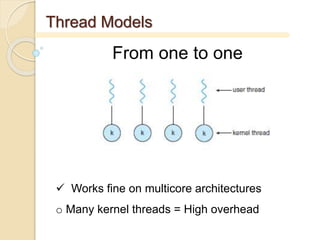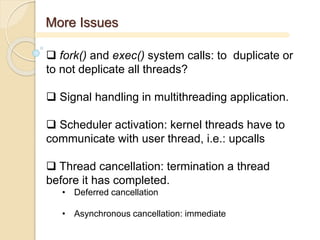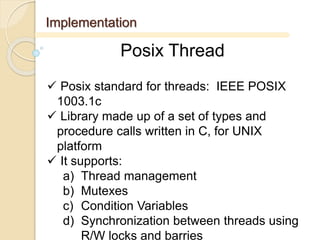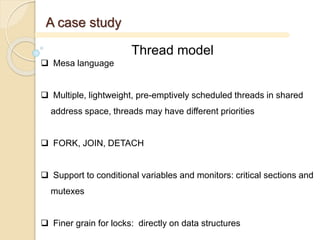Threads and multi threading
- 1. Threads Cesarano Antonio Del Monte Bonaventura Università degli studi di Salerno 7th April 2014 Operating Systems II
- 2. Agenda Introduction Threads models Multithreading: single-core Vs multicore Implementation A Case Study Conclusions
- 3. CPU Trends
- 5. Memory: Heavy vs Light processes Introduction
- 6. Why should I care about Threads? Pro • Responsiveness • Resources sharing • Economy • Scalability Cons • Hard implementation • Synchronization • Critical section, deadlock, livelock… Introduction
- 7. Thread Models Two kinds of Threads User Threads Kernel Threads
- 8. Thread Models User-level Threads Implemented in software library Pthread Win32 API Pro: • Easy handling • Fast context switch • Trasparent to OS • No new address space, no need to change address space Cons: • Do not benefit from multithreading or multiprocessing • Thread blocked Process blocked
- 9. Thread Models Kernel-level Threads Executed only in kernel mode, managed by OS Kthreadd children Pro: • Resource Aware • No need to use a new address space • Thread blocked Scheduled Con: • Slower then User- threads
- 10. Thread Models Thread implementation models: From many to one From one to one From many to many
- 11. Thread Models From many to one Whole process is blocked if one thread is blocked Useless on multicore architectures
- 12. Thread Models From one to one Works fine on multicore architectures o Many kernel threads = High overhead
- 13. Thread Models From many to many Works fine on multicore architectures Less overhead then “one to one” model
- 17. Multithreading
- 18. How can We use multithreading architectures? Thread Level Parallelism Data Level Parallelis m Multithreading
- 21. Granularity Coarse- grained: Multithreading Context switch on high latency event Very fast thread-switching, no threads slow down Loss of throughput due to short stalls: pipeline start- up
- 22. Granularity Fine-grained Multithreading Context switch on every cycle Interleaved execution of multiple threads: it can hide both short and long stalls Rarely-stalling threads are slowed down
- 24. Context Switching Single-core Vs Multi-core Xthread_ctxtswitc h: pusha movl esp, [eax] movl edx, esp popa ret CPU ESP Thread 1regs Thread 2 registers Thread 1 TCB SP: .... Thread 2 TCB SP: .... Running Ready
- 25. Pushing old context Single-core Vs Multi-core Xthread_ctxtswitc h: pusha movl esp, [eax] movl edx, esp popa ret CPU ESP Thread 1regs Thread 2 registers Thread 1 TCB SP: .... Thread 2 TCB SP: .... Thread 1 registers Running Ready
- 26. Saving old stack pointer Single-core Vs Multi-core Xthread_ctxtswitc h: pusha movl esp, [eax] movl edx, esp popa ret CPU ESP Thread 1regs Thread 2 registers Thread 1 TCB SP: .... Thread 2 TCB SP: .... Thread 1 registers Running Ready
- 27. Changing stack pointer Single-core Vs Multi-core Xthread_ctxtswitc h: pusha movl esp, [eax] movl edx, esp popa ret CPU ESP Thread 1regs Thread 2 registers Thread 1 TCB SP: .... Thread 2 TCB SP: .... Thread 1 registers Ready Running
- 28. Popping off thread #2 old context Single-core Vs Multi-core Xthread_ctxtswitc h: pusha movl esp, [eax] movl edx, esp popa ret CPU ESP Thread 2 regs Thread 1 TCB SP: .... Thread 2 TCB SP: .... Thread 1 registers Ready Running
- 29. Done: return Single-core Vs Multi-core Xthread_ctxtswitc h: pusha movl esp, [eax] movl edx, esp popa ret CPU ESP Thread 2 regs Thread 1 TCB SP: .... Thread 2 TCB SP: .... Thread 1 registers Ready Running RET pops of the returning address and it assigns its value to PC reg
- 30. Problems Critical Section: When a thread A tries to access to a shared variable simultaneously to a thread B Deadlock: When a process A is waiting for resource reserved to B, which is waiting for resource reserved to A Race Condition: The result of an execution depens on the order of execution of different threads
- 31. More Issues fork() and exec() system calls: to duplicate or to not deplicate all threads? Signal handling in multithreading application. Scheduler activation: kernel threads have to communicate with user thread, i.e.: upcalls Thread cancellation: termination a thread before it has completed. • Deferred cancellation • Asynchronous cancellation: immediate
- 32. Designing a thread library Multiprocessor support Virtual processor RealTime support Memory Management Provide functions library rather than a module Portability No Kernel mode
- 33. Implementation Posix Thread Posix standard for threads: IEEE POSIX 1003.1c Library made up of a set of types and procedure calls written in C, for UNIX platform It supports: a) Thread management b) Mutexes c) Condition Variables d) Synchronization between threads using R/W locks and barries
- 34. Implementation Thread Pool Different threads available in a pool When a task arrives, it gets assigned to a free thread Once a thread completes its service, it returns in the pool and awaits another work.
- 35. Implementation PThred Lib base operations pthread_create()- create and launch a new thread pthread_exit()- destroy a running thread pthread_attr_init()- set thread attributes to their default values pthread_join()- the caller thread blocks and waits for another thread to finish pthread_self()- it retrieves the id assigned to the calling thread
- 36. Implementation Example N x N Matrix Multiplication
- 37. Implementation Example A simple algorithm for (int i = 0; i < MATRIX_ELEMENTS; i += MATRIX_LINE) { for (int j = 0; j < MATRIX_LINE; ++j) { float tmp = 0; for (int k = 0; k < MATRIX_LINE; k++) { tmp += A[i + k] * B[(MATRIX_LINE * k) + j]; } C[i + j] = tmp; } }
- 38. Implementation Example SIMD Approach transpose(B); for (int i = 0; i < MATRIX_LINE; i++) { for (int j = 0; j < MATRIX_LINE; j++){ __m128 tmp = _mm_setzero_ps(); for (int k = 0; k < MATRIX_LINE; k += 4){ tmp = _mm_add_ps(tmp, _mm_mul_ps(_mm_load_ps(&A[MATRIX_LINE * i + k]), _mm_load_ps(&B[MATRIX_LINE * j + k]))); } tmp = _mm_hadd_ps(tmp, tmp); tmp = _mm_hadd_ps(tmp, tmp); _mm_store_ss(&C[MATRIX_LINE * i + j], tmp); } } transpose(B);
- 39. Implementation Example TLP Approach struct thread_params { pthread_t id; float* a; float* b; float* c; int low; int high; bool flag; }; ……… int main(int argc, char** argv){ int ncores=sysconf(_SC_NPROCESSORS_ONLN); int stride = MATRIX_LINE / ncores; for (int j = 0; j < ncores; ++j){ pthread_attr_t attr; pthread_attr_init(&attr); thread_params* par = new thread_params; par->low=j*stride; par- >high=j*stride+stride; par->a = A; par->b = B; par->c = C; pthread_create(&(par->id), &attr, runner, par); // set cpu affinity for thread // sched_setaffinity }
- 40. Implementation Example TLP Approach int main(int argc, char** argv){ …. int completed = 0; while (true) { if (completed >= ncores) break; completed = 0; usleep(100000); for (int j=0; j<ncores; ++j){ if (p[j]->flag) completed++; } } …. } void runner(void* p){ thread_params* params = (thread_params*) p; int low = params->low; // unpack others values for (int i = low; i < high; i++) { for (int j = 0; j < MATRIX_LINE; j++) { float tmp = 0; for (int k = 0; k < MATRIX_LINE; k++){ tmp += A[MATRIX_LINE * i + k] * B[(MATRIX_LINE * k) + j]; } C[i + j] = tmp; } }
- 41. Implementation Performance 0 500 1000 1500 2000 2500 3000 3500 4000 4500 5000 5500 6000 6500 7000 7500 8000 8500 9000 Simple SIMD TLP SIMD&TLP 8 cores 4 cores
- 42. A case study Using threads in Interactive Systems • Research by XEROX PARC Palo Alto • Analysis of two large interactive system: Cedar and GVX • Goals: i. Identifing paradigms of thread usage ii. architecture analysis of thread-based environment iii. pointing out the most important properties of an interactive system
- 43. A case study Thread model Mesa language Multiple, lightweight, pre-emptively scheduled threads in shared address space, threads may have different priorities FORK, JOIN, DETACH Support to conditional variables and monitors: critical sections and mutexes Finer grain for locks: directly on data structures
- 44. A case study Three types of thread 1. Eternal: run forever, waiting for cond. var. 2. Worker: perform some computation 3. Transient: short life threads, forked off by long-lived threads
- 45. A case study Dynamic analysis 0 5 10 15 20 25 30 35 40 45 Cedar GVX # threads idle Fork rate max # threads max Switching intervals: (130/sec, 270/sec) vs. (33/sec, 60/sec)
- 46. A case study Paradigms of thread usage Defer Work: forking for reducing latency print documents Pumps or slack processes: components of pipeline Preprocessing user input Request to X server Sleepers and one-shots: wait for some event and then execute Blink cursor Double click Deadlock avoiders: avoid violating lock order constraint Windows repainting
- 47. A case study Paradigms of thread usage Task rejuvenation: recover a service from a bad state, either forking a new thread or reporting the error o Avoid fork overhead in input event dispatcher of Cedar Serializers: thread processing a queue o A window system with input events from many sources Concurrency exploiters: for using multiple processors Encapsulated forks: a mix of previous paradigms, code modularity
- 48. A case study Common Mistakes and Issues o Timeout hacks for compensate missing NOTIFY o IF instead of WHILE for monitors o Handling resources consumption o Slack processes may need hack YieldButNotToMe o Using single-thread designed libraries in multi- threading environment: Xlib and XI o Spurious lock
- 49. A case study Xerox scientists’ conclusions Interesting difficulties were discovered both in use and implementation of multi-threading environment Starting point for new studies
- 50. Conclusion
























![Context Switching
Single-core Vs Multi-core
Xthread_ctxtswitc
h:
pusha
movl esp, [eax]
movl edx, esp
popa
ret
CPU
ESP
Thread 1regs
Thread
2
registers
Thread 1 TCB
SP: ....
Thread 2 TCB
SP: ....
Running Ready](https://image.slidesharecdn.com/threadsandmultithreading-advancedoperatingsystemsunisa2014-151217142658/85/Threads-and-multi-threading-24-320.jpg)
![Pushing old context
Single-core Vs Multi-core
Xthread_ctxtswitc
h:
pusha
movl esp, [eax]
movl edx, esp
popa
ret
CPU
ESP
Thread 1regs
Thread 2
registers
Thread 1 TCB
SP: ....
Thread 2 TCB
SP: ....
Thread 1
registers
Running Ready](https://image.slidesharecdn.com/threadsandmultithreading-advancedoperatingsystemsunisa2014-151217142658/85/Threads-and-multi-threading-25-320.jpg)
![Saving old stack pointer
Single-core Vs Multi-core
Xthread_ctxtswitc
h:
pusha
movl esp, [eax]
movl edx, esp
popa
ret
CPU
ESP
Thread 1regs
Thread 2
registers
Thread 1 TCB
SP: ....
Thread 2 TCB
SP: ....
Thread 1
registers
Running Ready](https://image.slidesharecdn.com/threadsandmultithreading-advancedoperatingsystemsunisa2014-151217142658/85/Threads-and-multi-threading-26-320.jpg)
![Changing stack pointer
Single-core Vs Multi-core
Xthread_ctxtswitc
h:
pusha
movl esp, [eax]
movl edx, esp
popa
ret
CPU
ESP
Thread 1regs
Thread 2
registers
Thread 1 TCB
SP: ....
Thread 2 TCB
SP: ....
Thread 1
registers
Ready Running](https://image.slidesharecdn.com/threadsandmultithreading-advancedoperatingsystemsunisa2014-151217142658/85/Threads-and-multi-threading-27-320.jpg)
![Popping off thread #2 old
context
Single-core Vs Multi-core
Xthread_ctxtswitc
h:
pusha
movl esp, [eax]
movl edx, esp
popa
ret
CPU
ESP
Thread 2 regs
Thread 1 TCB
SP: ....
Thread 2 TCB
SP: ....
Thread 1
registers
Ready Running](https://image.slidesharecdn.com/threadsandmultithreading-advancedoperatingsystemsunisa2014-151217142658/85/Threads-and-multi-threading-28-320.jpg)
![Done: return
Single-core Vs Multi-core
Xthread_ctxtswitc
h:
pusha
movl esp, [eax]
movl edx, esp
popa
ret
CPU
ESP
Thread 2 regs
Thread 1 TCB
SP: ....
Thread 2 TCB
SP: ....
Thread 1
registers
Ready Running
RET pops of the
returning address
and it assigns its
value to PC reg](https://image.slidesharecdn.com/threadsandmultithreading-advancedoperatingsystemsunisa2014-151217142658/85/Threads-and-multi-threading-29-320.jpg)







![Implementation Example
A simple algorithm
for (int i = 0; i < MATRIX_ELEMENTS; i += MATRIX_LINE)
{
for (int j = 0; j < MATRIX_LINE; ++j)
{
float tmp = 0;
for (int k = 0; k < MATRIX_LINE; k++)
{
tmp +=
A[i + k] * B[(MATRIX_LINE * k) + j];
}
C[i + j] = tmp;
}
}](https://image.slidesharecdn.com/threadsandmultithreading-advancedoperatingsystemsunisa2014-151217142658/85/Threads-and-multi-threading-37-320.jpg)
![Implementation Example
SIMD Approach
transpose(B);
for (int i = 0; i < MATRIX_LINE; i++) {
for (int j = 0; j < MATRIX_LINE; j++){
__m128 tmp = _mm_setzero_ps();
for (int k = 0; k < MATRIX_LINE; k += 4){
tmp = _mm_add_ps(tmp,
_mm_mul_ps(_mm_load_ps(&A[MATRIX_LINE * i + k]),
_mm_load_ps(&B[MATRIX_LINE * j +
k])));
}
tmp = _mm_hadd_ps(tmp, tmp);
tmp = _mm_hadd_ps(tmp, tmp);
_mm_store_ss(&C[MATRIX_LINE * i + j], tmp);
}
}
transpose(B);](https://image.slidesharecdn.com/threadsandmultithreading-advancedoperatingsystemsunisa2014-151217142658/85/Threads-and-multi-threading-38-320.jpg)

![Implementation Example
TLP Approach
int main(int argc, char**
argv){
….
int completed = 0;
while (true) {
if (completed >= ncores)
break;
completed = 0;
usleep(100000);
for (int j=0; j<ncores;
++j){
if (p[j]->flag)
completed++;
}
}
….
}
void runner(void* p){
thread_params* params = (thread_params*)
p;
int low = params->low; // unpack others
values
for (int i = low; i < high; i++) {
for (int j = 0; j < MATRIX_LINE; j++)
{
float tmp = 0;
for (int k = 0; k < MATRIX_LINE; k++){
tmp +=
A[MATRIX_LINE * i + k] *
B[(MATRIX_LINE * k) + j];
}
C[i + j] = tmp;
}
}](https://image.slidesharecdn.com/threadsandmultithreading-advancedoperatingsystemsunisa2014-151217142658/85/Threads-and-multi-threading-40-320.jpg)









